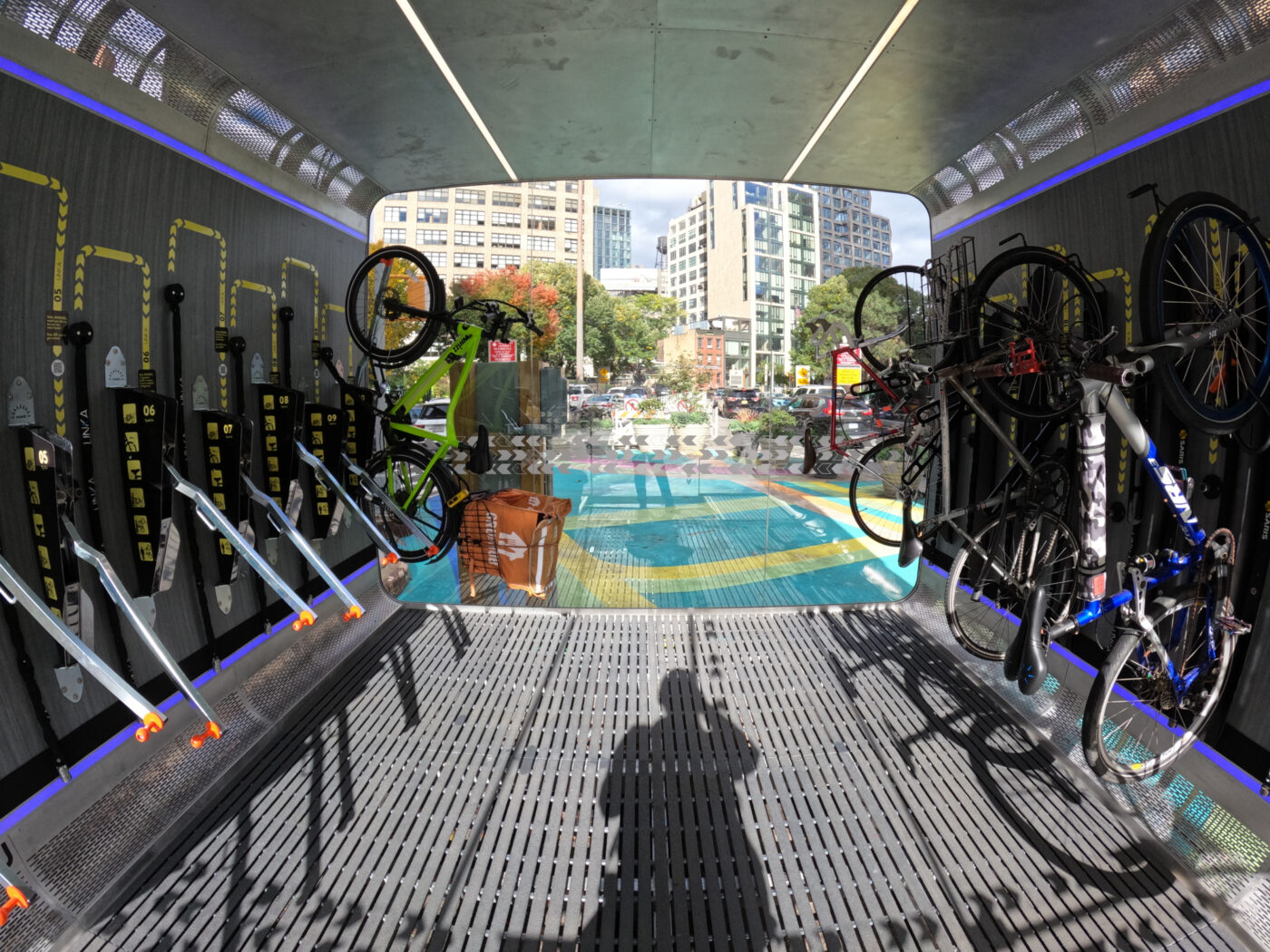
“I don’t think you’re going to find an outdoor facility that’s as advanced as this anywhere in the world.”
– Shabazz Stuart, Oonee
— This story is from my recent trip to New York City. See more coverage here.
48 hours ago I stood in the middle of Hudson Square in Lower Manhattan as hundreds of drivers crammed into the Holland Tunnel, and set my gaze on an Oonee pod for the first time. I’ve heard about these and followed their co-founder Shabazz Stuart online for years, but until Saturday had never seen one in person.
The appeal of this concept is that it can help us solve one of the biggest problems many cities, including Portland, face when trying to encourage cycling: give people confidence to park without worrying about theft.
I had no idea how an Oonee worked before I walked up on one for the first time in Brooklyn Saturday. All I did was download the app, get verified through a quick process (by uploading my driver’s license), and then I was a member. To get in, all you do is tap “open door” in the app. It’s a free system that allows any verified person to open the doors, walk in and park a bike.
It worked beautifully. And it looked even better.
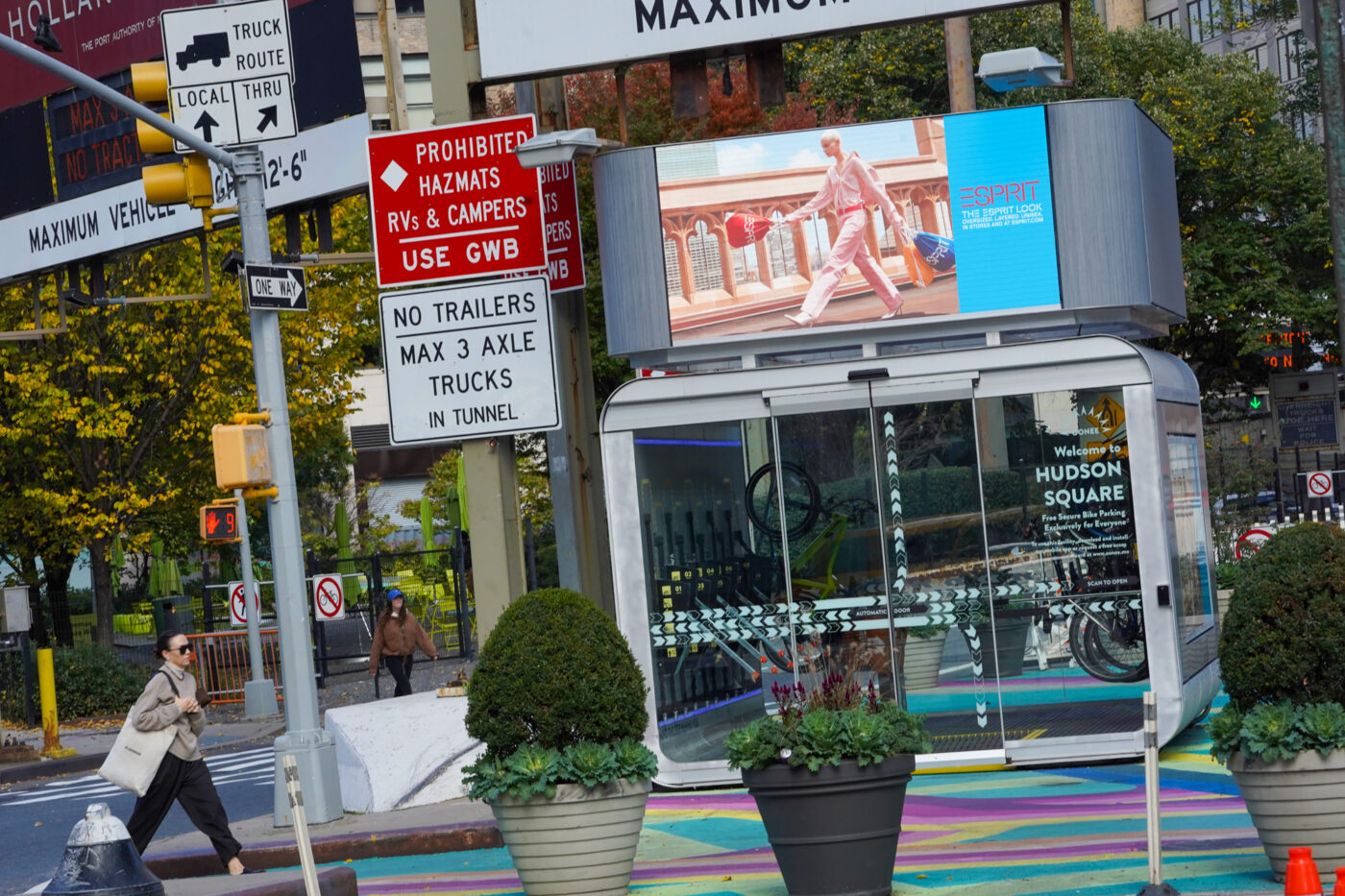
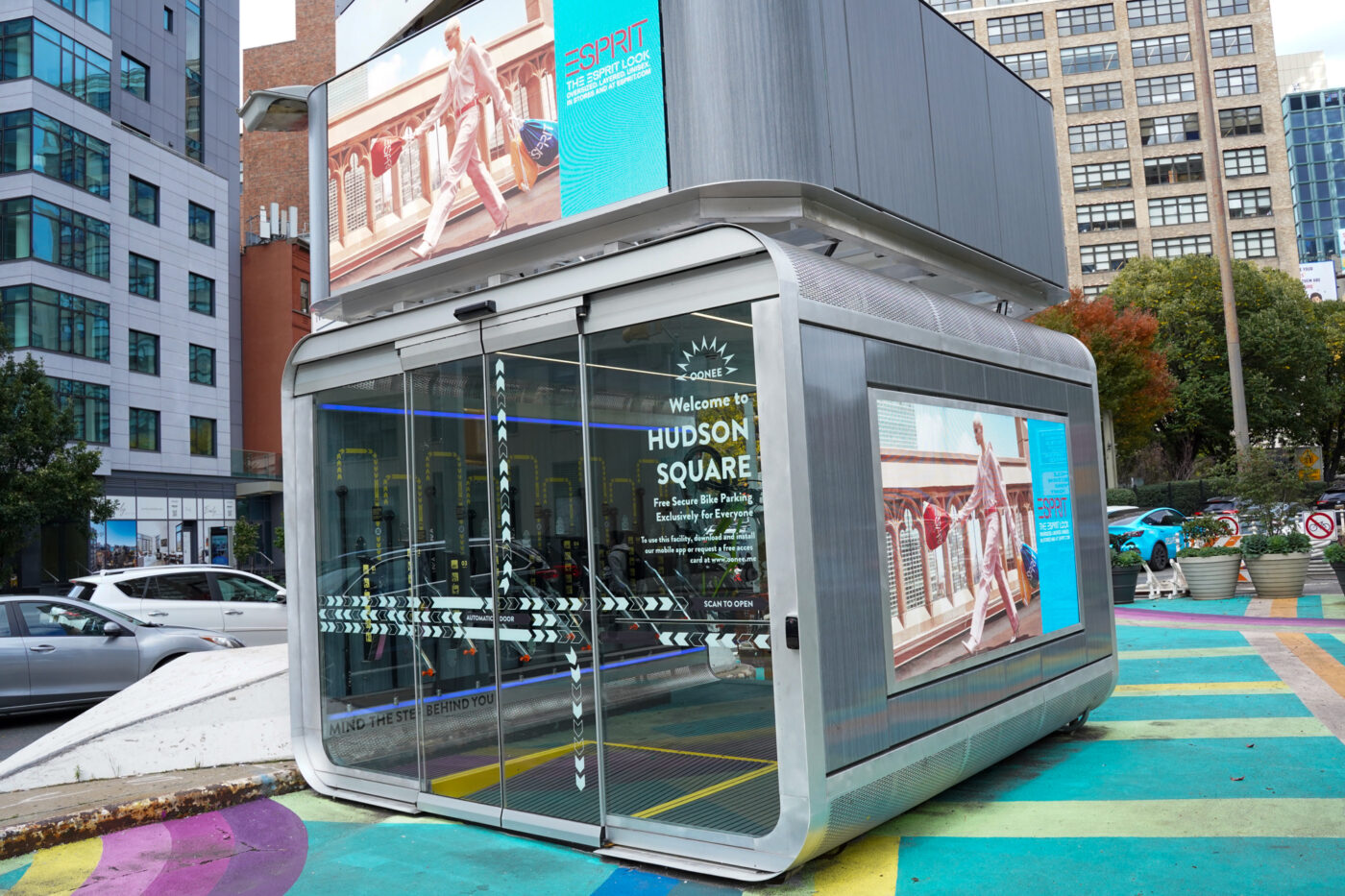

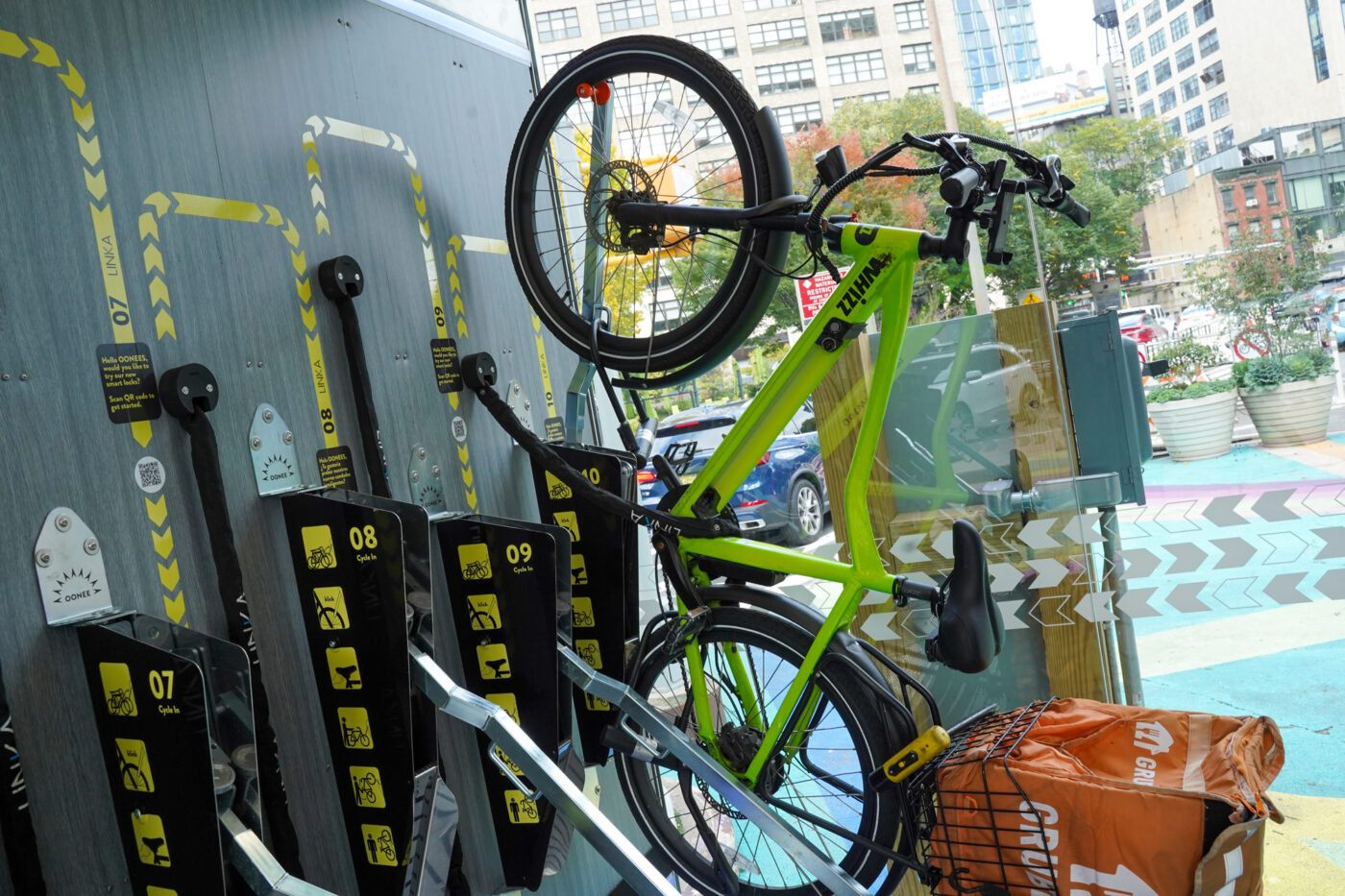
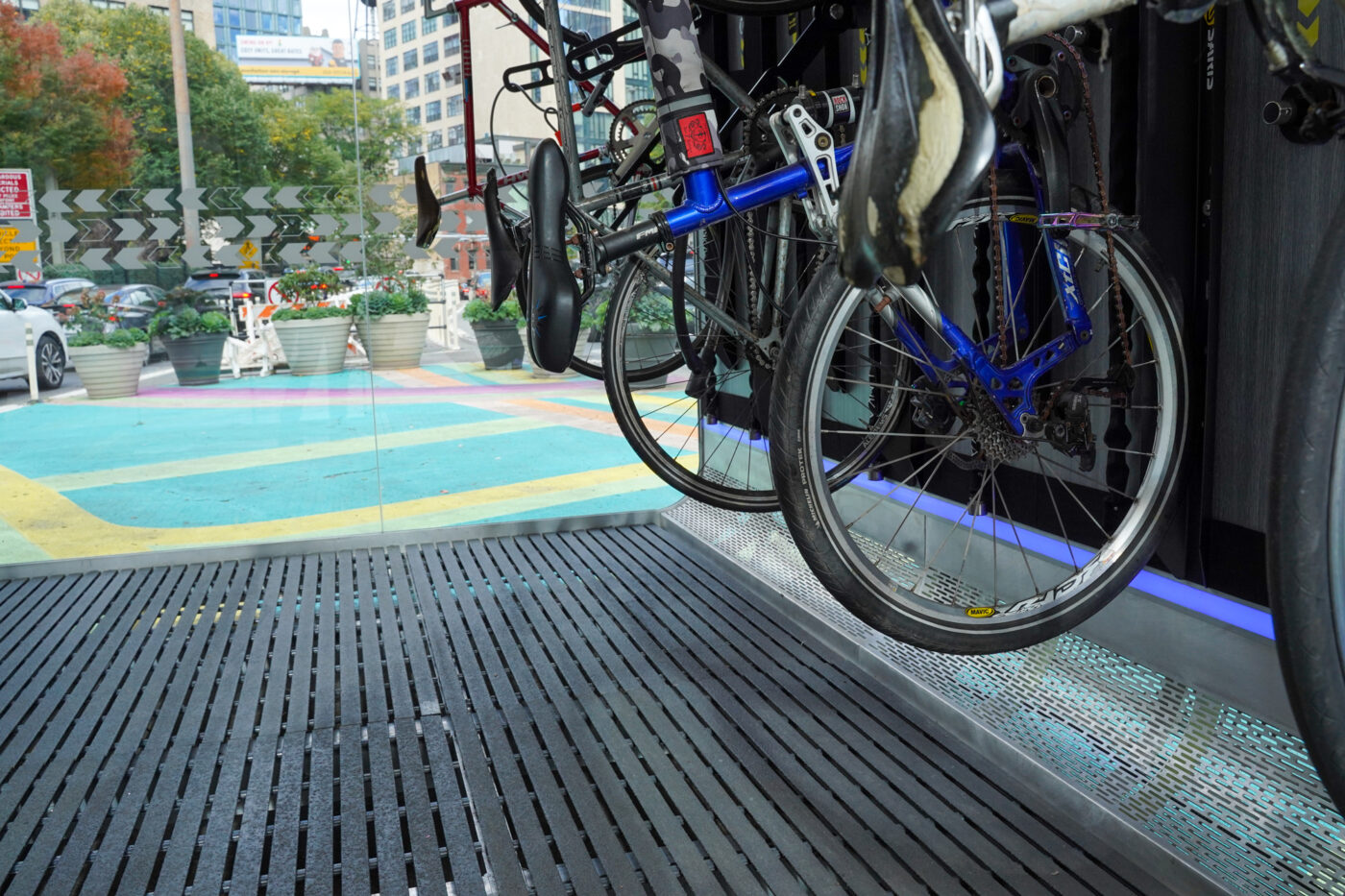
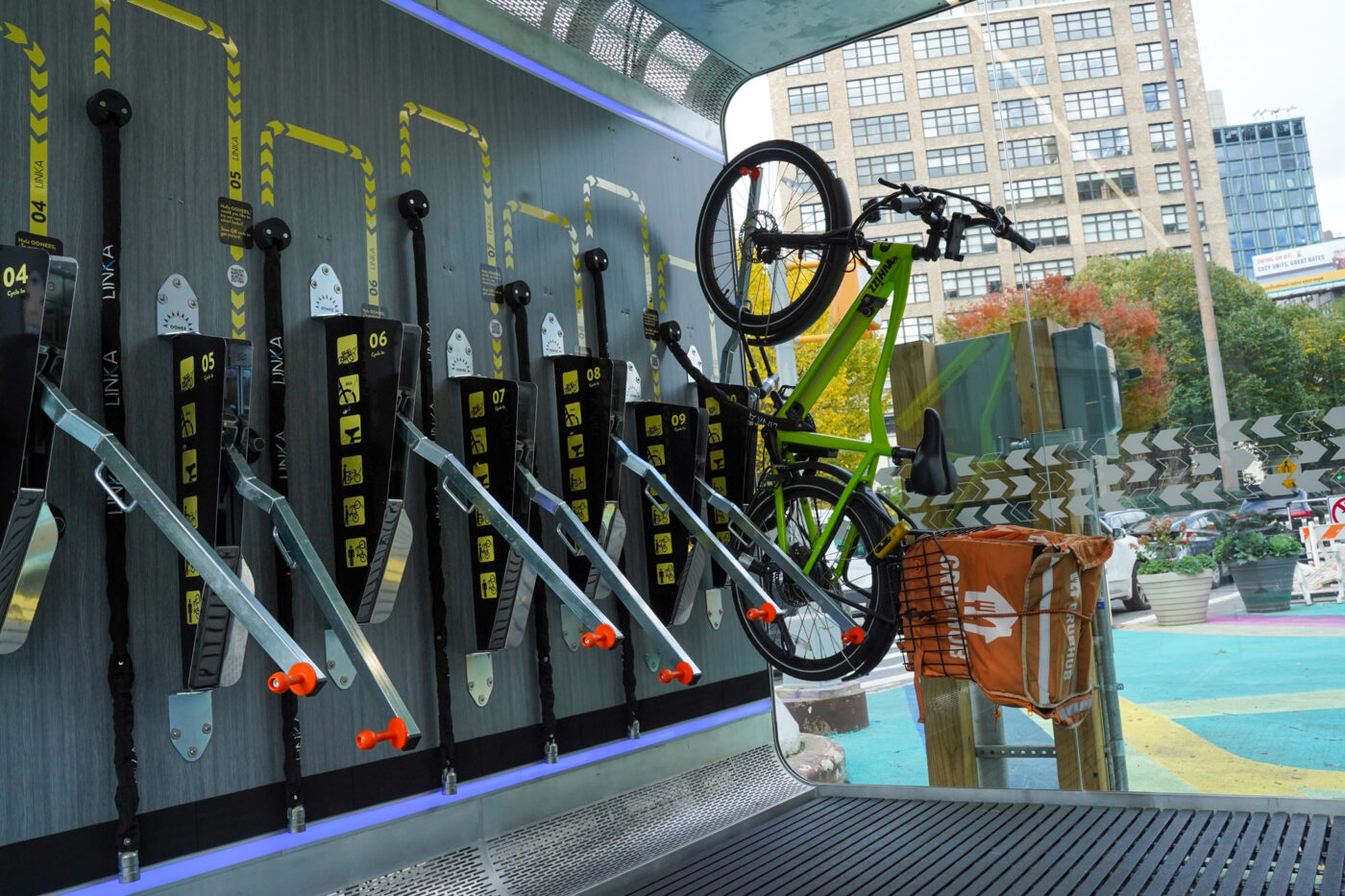

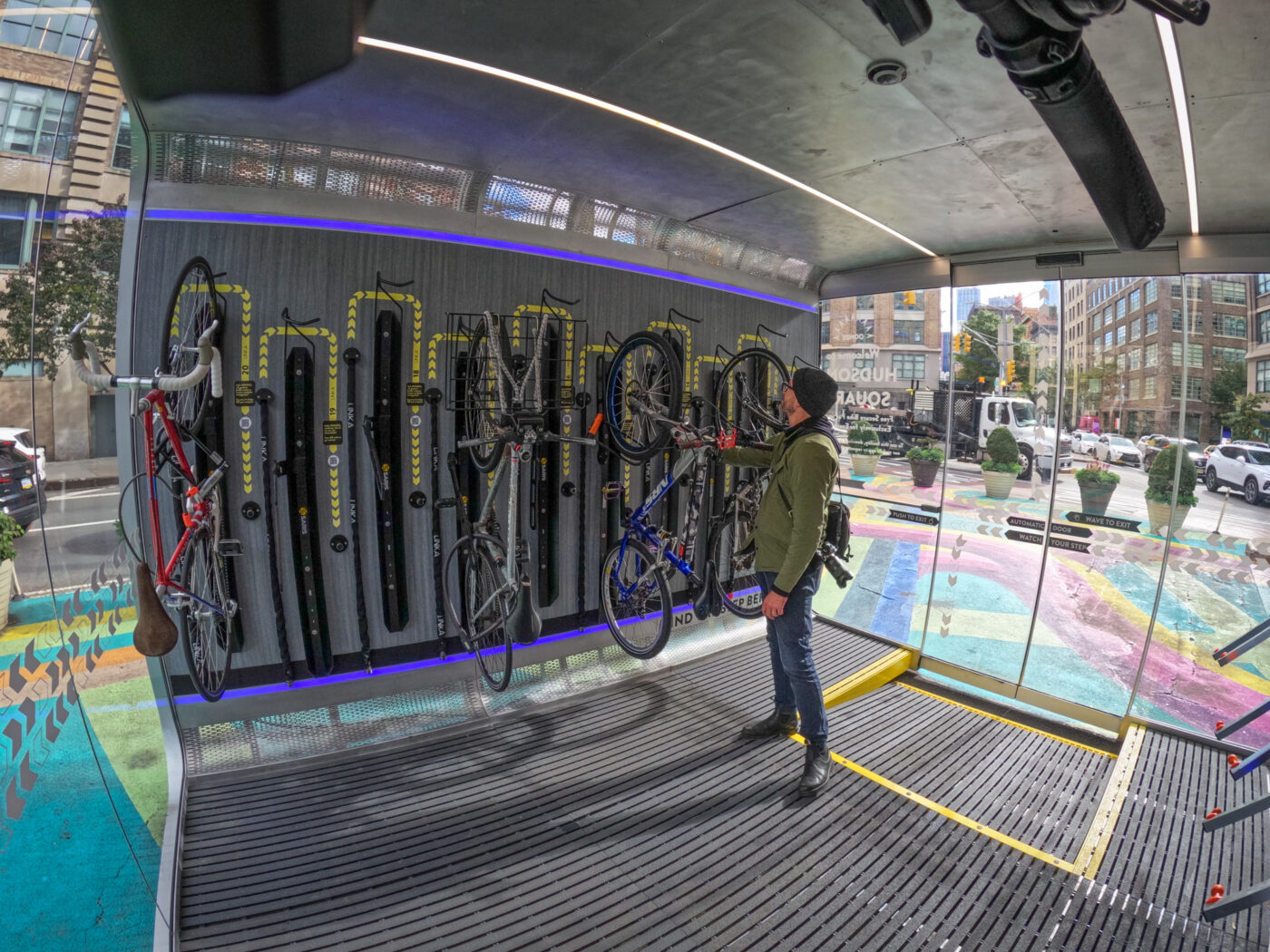
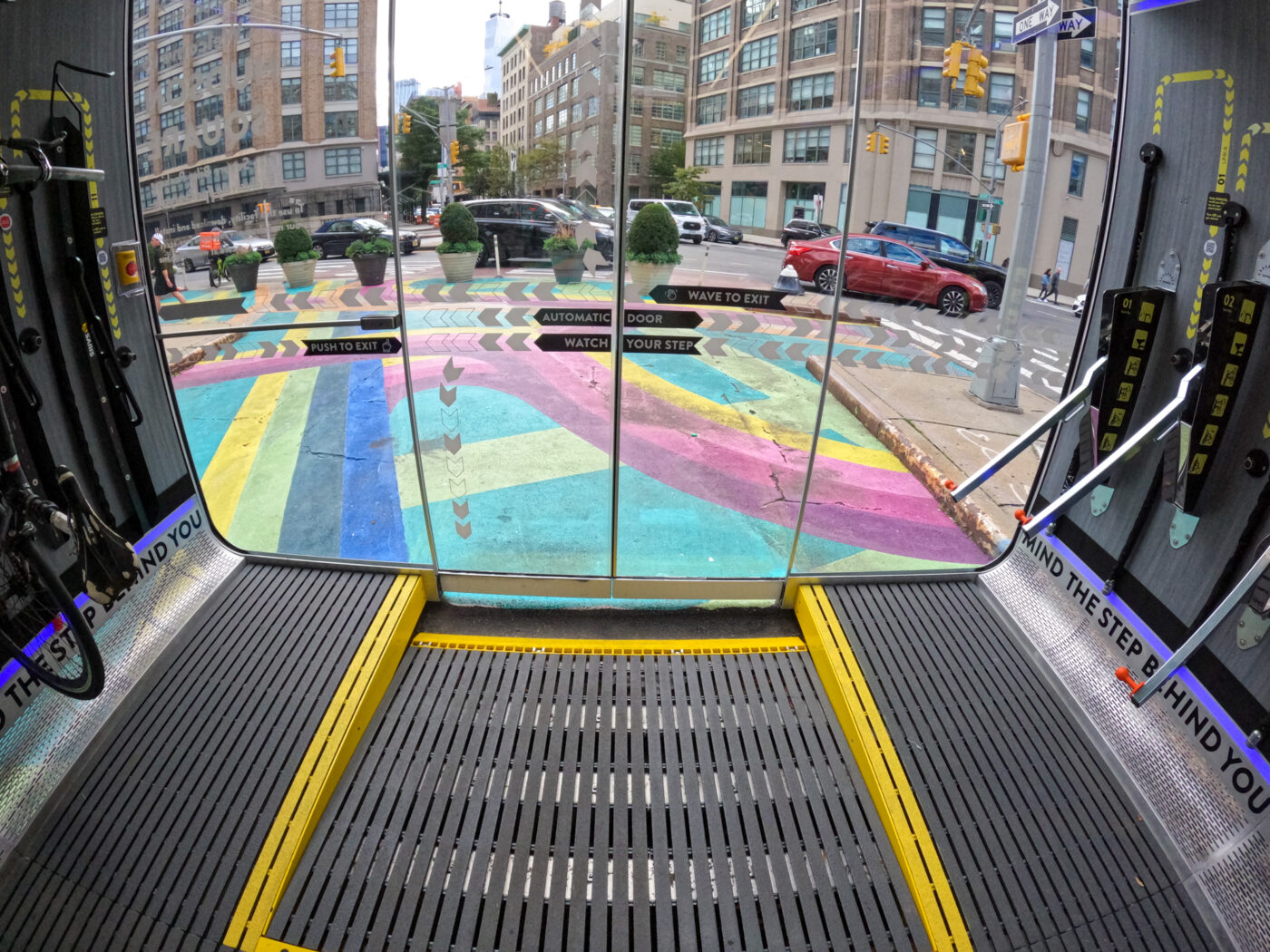
The Hudson Square pod (above) is one of 13 currently deployed. Oonee is a private “social impact startup” company run by Stuart and what he calls a “motley crew.” It was founded in 2018 and, after weathering the pandemic, is poised for growth.
Stuart has a grand vision. He’s not looking to place one pod here or there. “We seek to deploy vast networks of secure bike parking and charging facilities,” he told me in a FaceTime interview while I stood in the Hudson Square pod. “Citi Bike has 1,700 [docking] facilities across the city. We have to match that density pattern in order to be efficacious.” It may sound ambitious, but when you hear Stuart’s pitch, you start to believe it’s possible.
What sets Oonee apart is that they are a one-stop-shop.
“The thesis behind Oonee was, what if we just remove all the barriers? What if we did the planning? What if we did the finance? What if we did the community relations? What if we did the manufacturing, design, and operations? So all an agency had to do was say, ‘Yes, you can put it over there,'” he said, quite convincingly.
Oonee’s success in New York City thus far hasn’t gone unnoticed. They just signed a 30-pod contract with the City of Jersey City across the Hudson River and have a contract with the New York City Port Authority.
Back to the pod in Hudson Square. “I don’t think you’re going to find an outdoor facility that’s as advanced as this anywhere in the world,” Stuart said. He spoke confidently, but it didn’t come off as boasting because, well, from what I know, he was absolutely right.
Standing inside the pod you can tell the materials and finish are of the highest-quality. The automatic door, the thick glass, the ramp leading to the metal floor, all the design cues — it felt like a premium consumer product. Sort of like the iPhone of bike parking perhaps?
And the high quality design isn’t just a nice-to-have. Any urban planner will tell you that when a piece of infrastructure looks and feels world-class, it’s more likely to be treated with respect. I saw two Oonee pods while in New York City. Both were in very busy downtown locations (Barclay’s Center in Brooklyn and this one) and both were in pristine condition. No graffiti. No vandalism of any kind.
The racks themselves come in two varieties. The pod holds 20 bikes. One one side are 10 hanging hook racks built by Saris. On the other are a lift-assisted racks created by Oonee that can lift bikes weighing up to 75 pounds.
Is it really secure? “There’s no bike parking system in the world that’s like Fort Knox,” Stuart said. “I’ve never said we are theft-proof. We’re not. What we will say is you’re 99% less likely to experience theft, if it’s a high quality, securitized space.” Each pod comes equipped with two video cameras, the aforementioned ID verification system (“We know every single person who walks inside a facility,” Stuart said), self-locking chains on the racks, and users can also use their own locks.
Every year, Stuart said there are an average of two thefts across the system. And every verified parking customer has insurance. So if your bike does get stolen, they’ll send you a check to help buy a new one.
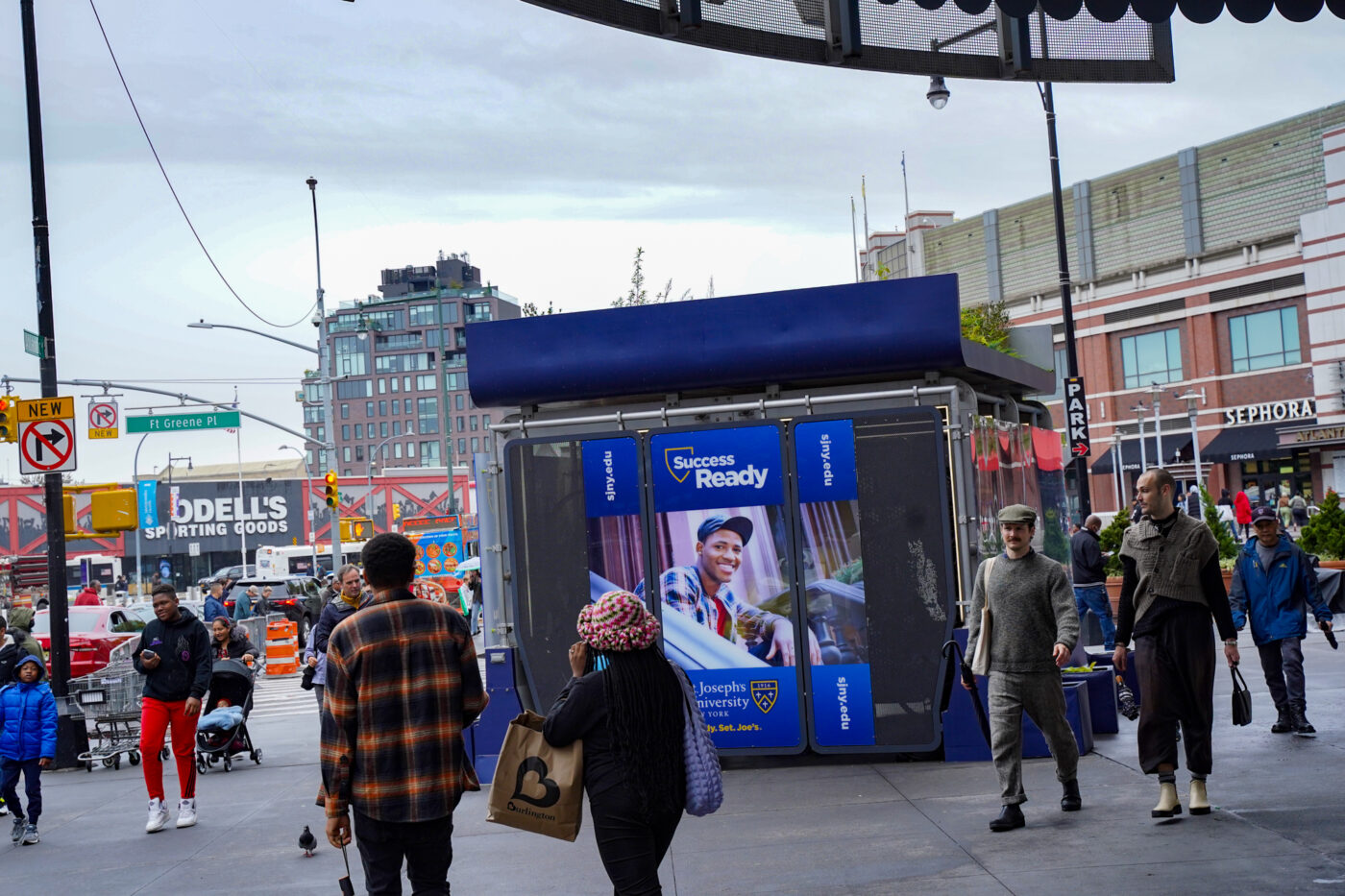

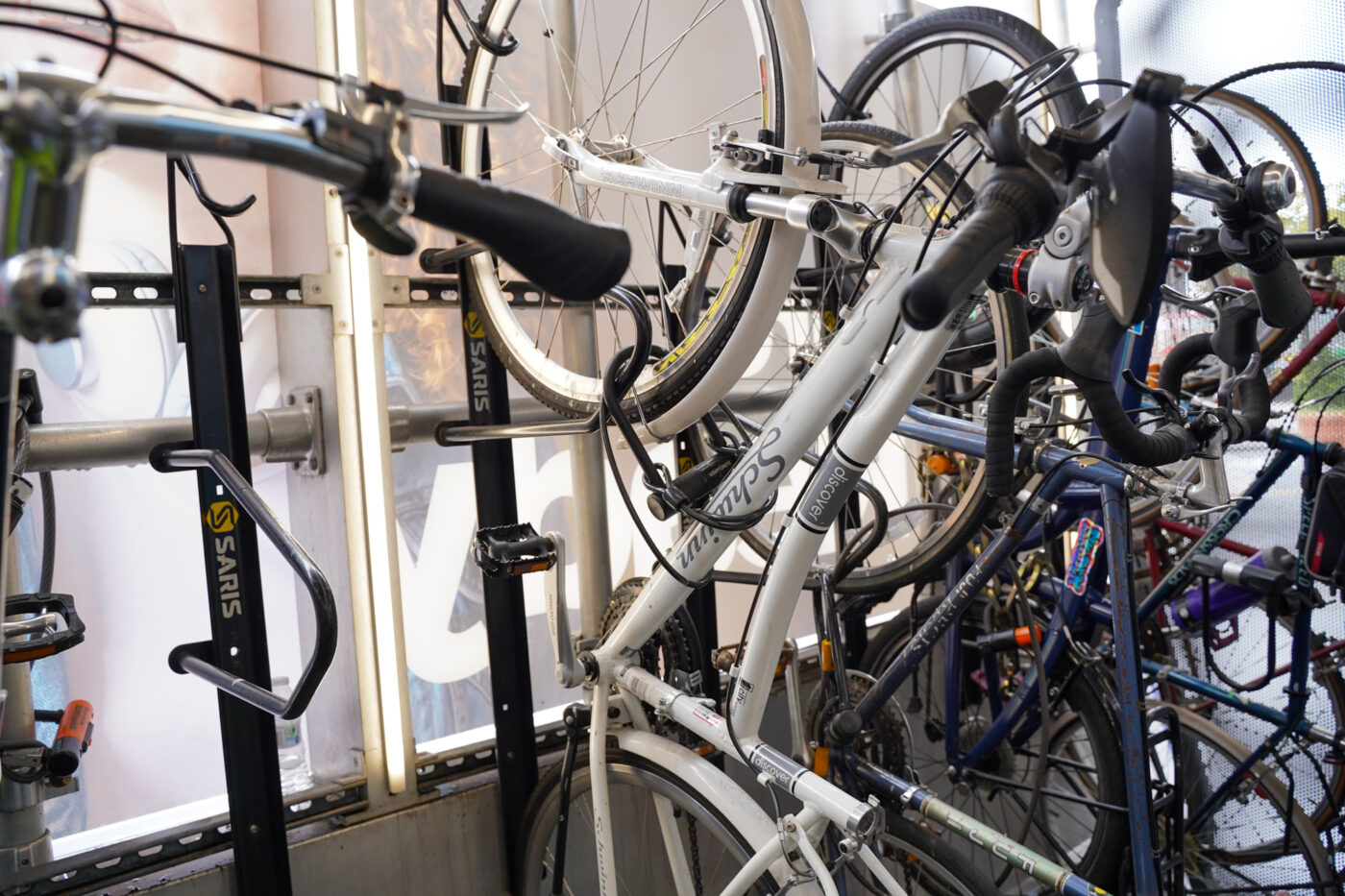
How can they offer this for free? Their model relies on advertising, not customer fees, to pay the bills. Stuart said the Hudson Square pod costs about $350,000 to build and deploy. Because of its prime Manhattan location, it makes almost all of that back in advertising revenue in a year thanks to its slick digital billboards on all sides. The high cost of advertising at locations like this help subsidize other pods.
To keep the ball rolling, Stuart and Oonee need to raise millions of dollars to build their team and deploy their vision of pods blanketing every major city in America. The money is there, he says, it’s just being spent on the wrong things.
“In 2017 there were billions of dollars being spent on scooter programs,” he said. “There are some good scooter companies out there… But venture capitalists were wasting so much money on ideas that weren’t producing ROI for society. I just think that we should be deploying capital in ways that that actually solves real problems.”
Oonee seems to be on the right path. Getting anything bike-related installed in such high-profile public places as Oonee has done — without massive bike-lash or a NIMBY war — is a massive feat in and of itself. Solving the problem of secure urban bike parking at a large scale, is just icing on the cake.
— Oonee.us




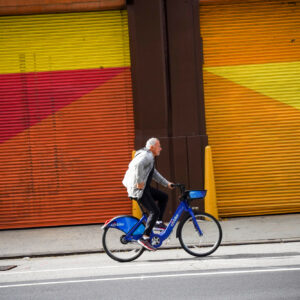
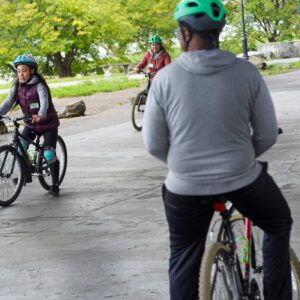
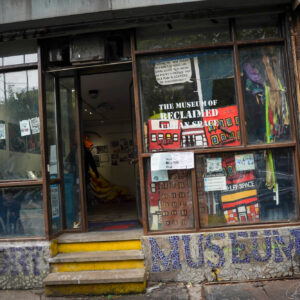
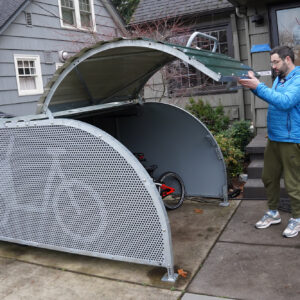
Thanks for reading.
BikePortland has served this community with independent community journalism since 2005. We rely on subscriptions from readers like you to survive. Your financial support is vital in keeping this valuable resource alive and well.
Please subscribe today to strengthen and expand our work.
Great article! Oonee has defineately carried onward the secure bike parking torch from Bikestation. They were finally able to monetize (subsidize) the bike parking structure in a way we were close to but never able to do on the West Coast with our partner cities. [I hope they are able to spread this advert pays/ sponsorsship model outside of the NYC/ NY bubble.]
Cycling hasn’t declined in Portland because there’s nowhere to park. It’s declined because the white collar middle class is working from home.
That’s part of it but it’s also that people don’t feel safe biking in the new Portland . Also, I think the theft risk from that unit would be too high. Manhattan has more cops (a LOT more) .
New York City, the city famous for not having a lot of crime
Look at the per capita property crime stats. If you think NYC is bad, the data may surprise you.
https://www.opendatanetwork.com/entity/1600000US3651000-1600000US4159000/New_York_NY-Portland_OR/crime.fbi_ucr.rate?crime_type=Aggravated%20assault&year=2018&ref=compare-entity
Comparing city crime rates, the very thing the FBI says not to use their data for https://ucr.fbi.gov/cautionagainstranking.pdf
Yes, it is a quick and simple (simplistic) analysis, and gives us no insight into the variables driving the respective crime rates. However, there’s no reason to think the headline aggregate numbers are radically wrong.
I’d be happy to consider a more comprehensive and sophisticated analysis if you know of one.
Note: this is private sector solution for a public problem. Instead of spillover cost it has public benefits.
The private operators would have motivation to prevent and follow up on property crimes. It’s been my experience over time that the PPB doesn’t have much attention span for bike thefts. No more Bike Theft Task Force–those were the days.
Also, pod users have at least some insurance while parking. That speaks of confidence. Bike insurance should be cheap and easy instead of limited and rare.
I don’t think any one factor can be pinned as ‘the reason’ and blaming WFH is an oversimplification. Particularly since Portland isn’t the only city with white collar workers, yet other cities have seen growth in cycling. The cycling decline in Portland also was already getting started prior to the pandemic and subsequent increase in WFH. We could likely find a correlation with many things – population influx, rise of SUV/trucks on the road, newly ubiquitous cell phones, changing commute patterns, etc.
With the rise of pricier e-bikes, secure parking is definitely on the mind of those who are interested but haven’t quite made that leap yet. It’s a piece of the bike network puzzle that needs to be addressed.
West coast cities with a far higher percentage of people who work from home have recovered and even exceeded 2019 levels. The decline in bike mode share in Portland is uniquely awful.
This is dumb. I don’t wanna use an app to park my bike. It’s just gentrified staple racks but they capture, store, and sell your face and movement patterns.
Just give us more of those rows of staple racks that replace street parking spots.
It depends on the rates of theft. Bike theft in places like Manhattan and San Francisco is next level. In those places, if you use staple parking, you practically have to dismantle half your bike yourself and carry it around with you, if you don’t want a thief doing it for you.
We’re pretty next level too.
I ride everywhere around the Portland metro area, and I have done so for decades. And in all that times, I’ve only had a couple bikes ever stolen outright, and once because I had left it unlocked in the open. And I’ve had articles stolen OFF of bikes on maybe a half a dozen occasions in all those years. Whereas, in less than dozen visits to Manhattan and San Francisco, I had a bike stolen once and articles stolen OFF of bikes a majority of times. So based on my admittedly purely anecdotal experience, you are grossly mistaken.
Hm, I disagree that it’s dumb. While your comfort level is fine with a staple, that’s not the case for a lot of people. Having somewhere secure to park their bike is a genuine hurdle for many would-be bike riders. I can see the concern that people would have with the data the oonee pods collect, but don’t think that the alternative should be dismissing the value of secure parking.
Yeah. And just look at the Netherlands. They don’t need this bike storage and they use bikes all the time
I hope this comment is satire, I’m never sure on the internet. The Netherlands have invested in bike parking at a national level to the tune of hundreds of millions of Euros.
Examples:
https://www.bloomberg.com/news/articles/2023-04-20/how-the-dutch-investment-in-bike-parking-paid-off
https://www.theverge.com/23572761/amsterdam-underwater-bike-garage-future-of-transport
Doesn’t the Netherlands have the world’s biggest bikeparking garage, or something? It *is* also entirely different country,,,, a lot of things about their culture are different than what we have an Portland.
A bit of sanity about the Netherlands is on order.
From the Dutch Cyclists Union:
“The Netherlands has the highest rate of bicycle theft in Europe. According to a report by the Dutch Cyclists’ Union, approximately 500,000 bicycles are stolen in the Netherlands each year, which equates to about one bicycle stolen every minute.”
Uh, I think there is next level ignorance about the Netherlands… you know, the bike Utopia…
I didn’t say that they didn’t.
They also have insane levels of bike theft.
The street and sidewalk space that’s been essentially abandoned by Portland Biketown could be repurposed for parking pods. This business model is self-financing and creates a feeling of amenity. It doesn’t solve all problems but would represent a big step forward. Pods could concentrate all kinds of mobility devices, reducing sidewalk clutter which is one of the worst attributes of things like scooters.
When can we get these pods in Portland? I’ve said for years that every single business should provide secure bike parking, and these pods are a good way to do it.
I do wonder about the doors and what keeps a member from letting a non-member (thief) thru the door. The guys running Portland’s chop-shops would certainly see these pods as a great source of bikes and parts, especially if they are open all night. Also I can’t imagine the listless PPB wanting to get involved when someone smashes in a door.
In a place like Manhattan, where many, many eyes will travel past a billboard, I can imagine that a traditional advertising-based funding model would be effective. I would worry, however, that outside of Manhattan, a funding model that is based on advertising-dependency and a sign-up process that collects a lot of personal information about the user will very quickly become another way to sell that personal information to advertising agencies. I would rather pay for access to such a secure bike parking pod if there was an option, so that my use of the service would not become another way to harvest personal data.
That’s a good question about the viability of the business model. At this point, doesn’t seem like we know for sure. It also seems like not a stretch to change to a paid service, either for specific regions or as an option. I agree it’d be nice to opt out of sharing personal info with advertisers (the privacy policy seems to indicate this is done – tho I’m no legal expert: https://www.oonee.me/terms-of-service/#privacy-policy)
As a bike rider, the pod looks really nice and I’d feel a lot more confident using it than a rack out in the open in even modestly high theft areas. While I’d also like to see larger bike parking garages like in the Netherlands, the pods seem like a potentially more incremental approach that might be more feasible especially in US cities.
Great idea! We need secure bike parking throughout the city! This will decrease bike theft and increase bike usage. Very exciting.
Oonee’s app will not accept a sign-in. I asks for a ‘valid email’ no matter what email you enter. Disappointed, had hopes for the company.